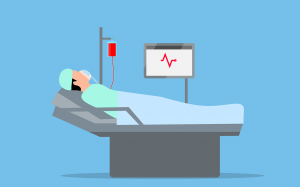March is National Traumatic Brain Injury Awareness Month, so we want to take this time to look at this type of injury, and raise awareness of the risk to older adults. A traumatic brain injury, or TBI, can happen when your head takes a severe blow and your brain hits your skull, causing a concussion or serious brain damage. This type of injury is something that older adults should be especially wary of, because as you get older, falling and hurting your head becomes much more likely to happen than when you were younger. That means it’s important to understand what signs to watch out for, so you can get the appropriate help as soon as possible.
How Common Are Traumatic Brain Injuries?

Traumatic brain injuries are a leading cause of disability and death in the United States, contributing to almost 3 million emergency room visits, hospitalizations, and deaths each year. According to the CDC, more than 54,000 adults died from TBI in 2014.
Anyone can experience a traumatic brain injury, but almost 80% of them happen to men, and they are more common among people older than 65, because older adults are more prone to losing their balance, falling, and hitting their heads.
Types of Traumatic Brain Injuries
There are several different types and grades of traumatic brain injuries:
- Mild concussion – Also known as mTBI, this is the most common type of TBI, accounting for roughly 3 out of 4 TBIs every year. Symptoms include feeling dazed or losing consciousness for less than 30 minutes, and confusion for a day or so.
- Moderate TBI– Symptoms include loss of consciousness for over 30 minutes, but less than one day, and confusion that can last for up to 1 week.
- Severe TBI– If you lose consciousness for at least one full day, your TBI is considered severe.
- Uncomplicated TBI– Your TBI is considered uncomplicated if you receive a CAT scan or brain MRI, and it comes back normal, regardless of the severity of the brain injury.
- Complicated TBI– This means that your head CT scan or brain MRI shows changes, such as bleeding in the brain.
- Closed TBI– This means that an outside force caused the blow to the head, but it did not penetrate the skull. A closed TBI can still cause swelling of the brain.
- Open TBI– Also known as a penetrating TBI, this occurs when a bullet, knife, or something else goes through the skull, damaging brain tissue.
Top Cause of Traumatic Brain Injuries
For older adults, the top cause of a traumatic brain injury is a fall: in fact, falls account for almost half of all emergency room visits, mainly for people 65 and older. These falls generally happen when someone loses their balance or trips over something; if they hit their head when they fall, their brain will experience chemical changes to compensate for the injury. 
It is important to do everything you can to prevent falls and protect yourself from traumatic brain injury, which can result in damage to your brain cells. To do this, you should make sure that your home is as safe as possible; fortunately, Medicare will cover a home assessment for you to make sure that you are safe from falls and traumatic brain injuries.
Warning Signs of TBI
As we laid out above, there are different levels and grades of traumatic brain injuries. But whatever the grade of your injury, one of the key signs of a TBI is loss of consciousness after receiving a blow to the head, or feeling dizzy for a couple of minutes. You can experience several different symptoms, and if you do, it is very important that you seek help immediately. Some of the warning signs of TBI include:
- Confusion or memory problems
- Dilated pupils or blurred vision
- Headaches
- Behavioral or mood changes
- Slurred speech
- Sensitivity to light and smell
- Nausea and vomiting
- Restlessness
- Dizziness
- Fatigue
- Agitation
- Sleeping too little or too much
Treatment/Management of TBI
If you suspect you have had a traumatic brain injury, go to the emergency room, or speak to your healthcare provider, who will examine you. You might have to undergo a neurological evaluation, imaging testing, and/or a blood test to look for protein in your blood that would indicate concussion or mild traumatic brain injury.
After identifying a TBI, your doctor will treat you based on the type and severity of the injury. If you have a mild traumatic brain injury, you will only need minimal treatment, which will typically include relaxing and taking a rest from any work or strenuous activity for a couple of weeks. However, if you have a severe traumatic brain injury, you will need hospital care and more intensive treatment such as:
- Counseling for emotional support
- Surgery to stop any bleeding in the brain
- Physical, occupational, and speech therapy, if necessary
It is important to note that the older you are, the slower your recovery will be. And if you have had any prior traumatic brain injuries, it will also take a little longer to recover from your current traumatic brain injury.
Complications Accompanying Traumatic Brain Injury
Unfortunately for some people, there can be complications that accompany a traumatic brain injury. People with traumatic brain injuries have a higher risk of developing anxiety, depression, post-traumatic stress disorder, seizures, and epilepsy. Moderate or severe traumatic brain injury can cause permanent brain damage and disabilities, and in some rare cases, can lead to Alzheimer’s disease, dementia, or movement disorders.
Preventing TBI

Traumatic brain injuries are not always preventable, but there are some things you can do to try to prevent falls :
- Assess your medications– Some medications can cause dizziness, which can lead to falls, so it is important to monitor your medications to know which ones make you dizzy or sleepy. Speak to your doctor to find out if it is possible to change your medications to ones that don’t cause dizziness or sleepiness.
- Stay active- One of the best ways to prevent falls is to remain active. Keeping your body moving by doing things like yoga or Tai Chi helps build muscle and improve your balance.
- Use walking assistance– Walkers and canes can help you to be steadier on your feet if you have issues walking or with your balance.
- Fall proof your home– As we mentioned earlier, Medicare will cover a home assessment to make sure that you are safe. They will suggest things like removing any rugs that can trip you, and installing stair handrails and bathtub grab bars. Medicare Part B can also cover any durable medical equipment needed such as walkers or canes, as well as any modifications to your home, such as a ramp for a wheelchair or grab bars.
The older you are, the more likely you are to experience a traumatic brain injury caused by a fall. Some falls can even lead to death if the blow to your head is hard enough, which is why it is really important to make sure that you are safe in your home and when walking. And if you do experience any type of head injury, have your healthcare provider check it out no matter how minor the injury seems at the time.
And in the meantime, take the proper steps to prevent falls by utilizing Medicare and what they offer to make sure that you are safe at home. And while Medicare Part B covers a lot, it will only cover 80% of expenses, leaving you the remaining 20% to pay out-of-pocket. This can be quite expensive, especially if you are living on a fixed income, as many Medicare beneficiaries are. Fortunately, though, you can save money on medical expenses and get extra coverage by purchasing a Medicare Supplement Plan.
There are 10 different Medicare Supplement Plans to choose from, each offering different coverage options and rates. It’s worth looking into a Medicare Supplement Plan to save as much money as you can, so speak to an EZ agent for all of your options. EZ’s agents work with the top-rated insurance companies in the nation and can compare plans in minutes for you at no cost. To get free instant quotes for plans that cover your current doctors, simply enter your zip code in the bar on the side, or to speak to a licensed agent, call 888-753-7207.

